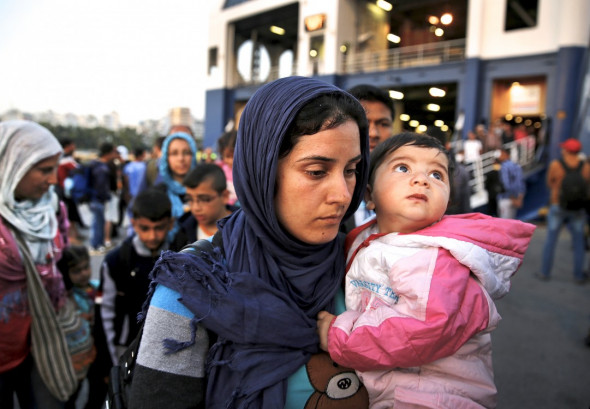Above Photo: From occupy.com
Google is blocking our site. Please use the social media sharing buttons (upper left) to share this on your social media and help us break through.
At last count, one-third of the 60,000 refugees currently stranded in Greece are school-age children. Trapped in the country due to the E.U.’s inability to address the escalating humanitarian crisis, the children’s educational prospects are shrinking by the day. Now, since summer school programs for refugee children failed last summer due to budget constraints and lack of specialized staff, individual teachers have begun taking it upon themselves to teach Syrian children elementary Greek.
However, a lack of government-appointed translators has made the volunteers’ work all the harder, forcing them to improvise or pantomime their way through classes while relying on older students to help get the message across. Despite their attempts, little progress has been made toward integrating the refugee children with Greek students. If anything, it appears the process is being actively discouraged by a Greek educational system that separates Syrian students’ class schedules from locals, exacerbating the rift.
According to Aura, a child psychologist working in the Softex refugee camp in Thessaloniki, “Being present at school during totally different hours makes it impossible to make contact and friends with local children. The longer they are excluded, the harder it gets to seek out contact because of the feelings of shame – not knowing the language, living in a camp – which of course has an impact on the self-esteem of the child.”
The school stigmatization has even allowed some nationalist elements to grow, especially in areas that experienced a sudden influx of refugees at the beginning of the school year. Earlier this year in Oreokastro, a suburb of Thessaloniki, a nationalist group called the Patriotic Union of the Greek Citizens of Oreokastro attempted to chain themselves to the gates of the local school to keep any refugee children from entering. Riot police were called in to disperse the protesters after they began throwing stones at the gathered children.
In a statement about the incident, the school’s principal, Ioannis Nomikoudis, said, “The parents of the children here are not racist, but they do still have concerns and we cannot ignore that. The thing is, we didn’t make the children’s arrival debatable – like in some places.”
But it isn’t only Syrian children who continue to suffer. Afghan refugees have been a long-standing minority in the country since early 2008, with a steady trickle of displaced families and individuals attempting to enter the E.U. through Greece. Following the dramatic influx of Syrians, Afghans’ long-standing plight only seems to have gotten worse.
In Elliniko, one of the oldest Afghan refugee camps, activist Masoud Qahar has struggled to improve the refugees’ abysmal living conditions for years. After being forced to leave his home by the Taliban, which threatened to abduct his seven-year-old daughter if he didn’t cooperate, he led his family into the E.U. only to find themselves at a now defunct international airport.
“Some NGOs are coming to help, but it’s just for two or three days,” said Qahar. “They play with kids, take a lot of pictures of the kids, and they take money for this. A lot of news channels come here and make movies, documentaries. They have a business [profiting from] the refugees. [It’s] like a zoo, and we’re like animals [to the NGOs and media].”
According to a recent study by Amnesty International, the European Union has knowingly deported Afghan nationals who attempted to find refuge within the member states. Investigations found that over 10,000 individuals have been sent back to Afghanistan where they openly faced threats of death or torture.
“These returns brazenly violate international law and must stop immediately,” said Horia Mosadiq, an Afghan researcher for Amnesty. “The same European countries that once pledged support for a better future for Afghans are now crushing their hopes and abandoning them to a country that has become even more dangerous since they fled.”
Another recent report, submitted by the United Nations Assistance Mission in Afghanistan, revealed that almost 12,000 civilians were killed or tortured by extremist militant groups including the Taliban and ISIS within the past year alone. Yet while the deportations could be constituted as flagrant violations of Afghan refugees’ civil rights, it doesn’t seem to have largely concerned E.U. officials. According to a document leaked last month, “more than 80,000 persons could potentially need to be returned in the near future.”
Some view the deportations as a means of applying pressure on the Afghan government to comply with the needs and demands of the E.U. However, with more than 5,000 undocumented civilian dead having surfaced in the UN investigation, it seems that Europe remains perfectly aware that by sending refugees home, it is marching desperate people toward their slaughter.


